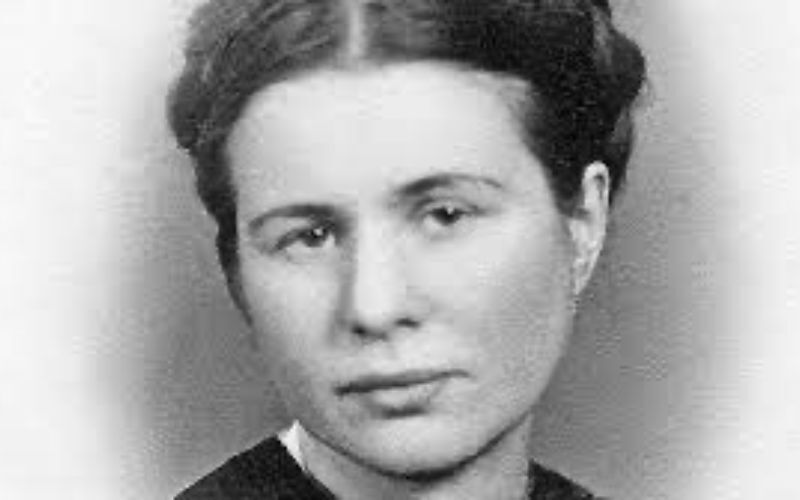Lena Mukhina

Diary of a Russian Teenager Who Survived 872-day Siege
Learn more about the 900 Day Seige of Leningrad in Voices Case Studies of World War II. In addition to learning of the history of the seige, view dynamic pictures, read the poetry of Anna Akhmatova, Konstantine Mikhailovich Simonov and Vera Inber. There are also a number of activities to explore this period of history.
by Chris Parsons for UK Mail Online, September 9, 2011
A harrowing diary written by a Russian teenage girl during the Nazi siege of Leningrad 70 years ago has drawn comparisons with that of Anne Frank after being published for the first time. Lena Mukhina began writing the diary in May 1941 aged 16, describing the horror of watching her family die, as well as the pains of growing up.
The teenager told how she survived the entire 900-day Nazi blockade of Leningrad, but not before she watched her mother starve and saw countless bombing raids by German troops. Historians and experts have hailed the newly-published diary as a vividly-written chronicle of hunger, desperation and death.
As well as telling of horrors such as having to eat the family cat to fend off starvation, Lena's poignant diary describes more natural hopes and fears, such as her crush on a classmate called Vladimir and worries about bad school marks.
Her diary has been discovered in a state archive and is being published in the city, now known as St Petersburg. In one section, the teenager writes in November 1941: 'Today I turned 17. I'm lying in bed with a temperature and writing ... Aka [a family friend] this morning brought my 125 grams of bread and 200 grams of sweets. 'I've already eaten almost all the bread and the sweets have to last for 10 days.'
In a later troubling passage, Lena tells how the family's pet was sacrificed to keep the rest of them alive. It reads: 'Today we had delicious soup with meat and macaroni. The cat meat will be enough for two more meals.
'It would be good to get hold of another cat somewhere. I never thought cat meat would be so good and tender.' The heart-wrenching diary was given to a Soviet Union state archive in 1962 by a mystery donor.
It has lay there untouched ever since until it was recently unearthed by historian Sergey Yarov, an academic at the European University of St Petersburg.
Mr Yarov said he was struck by the quality of the writing in the diary, and that the passages reminded him of Anne Frank, the Jewish schoolgirl who penned her own feelings while hiding from Nazis in Amsterdam.
The siege began on September 8, two months after Germany launched its Operation Barbarossa blitzkrieg against the Soviet Union. Rations were soon cut to starvation levels as the city endured the siege which lasted nearly 900 days.
Mr Yarov said: 'Both diaries are about how they suffered repressions, but both diaries are also about how they developed, lived, how they were interested in their own girls' secrets.'
Experts assumed Lena had died in the Leningrad blockade after her diary stopped abruptly on May 25 1942, but it later emerged she lived until 1991, where she died in Moscow.
Marina Rymynskaya, who typed up the original manuscript, said: 'In the beginning, the diary reads like a love story. 'But on June 22 1941 (When the Nazis invaded the Soviet Union) the handwriting changed dramatically.
'At first I thought that somebody else was writing. It was psychologically and physically difficult to work on this project. After typing up two or three pages I often felt physically sick and had to get some air.'
In a remarkable twist, the publishers managed to trace relatives of Mukhina in Moscow and discovered that she had survived the siege. Unfortunately Lena had died in 1991 at the age of 66, leaving no family, and without ever mentioning the diary's existence.
'I knew she was in the siege, but she never used to talk about that. I had never heard anything about the diary,' her first cousin once removed, Tatyana Musina, said at the presentation of the diary. 'In the diary she appeals to the people who might find her diary if she died, asking them to give it to relatives so they could read what torment she went through.
And really, it turned out that 70 years later, we read all this and we cried.
'My sister and I cried when we read it. I think it's an amazing thing.'
Read more: The Anne Frank of Leningrad: Diary of Russian teenager who survived 872-day Nazi siege

